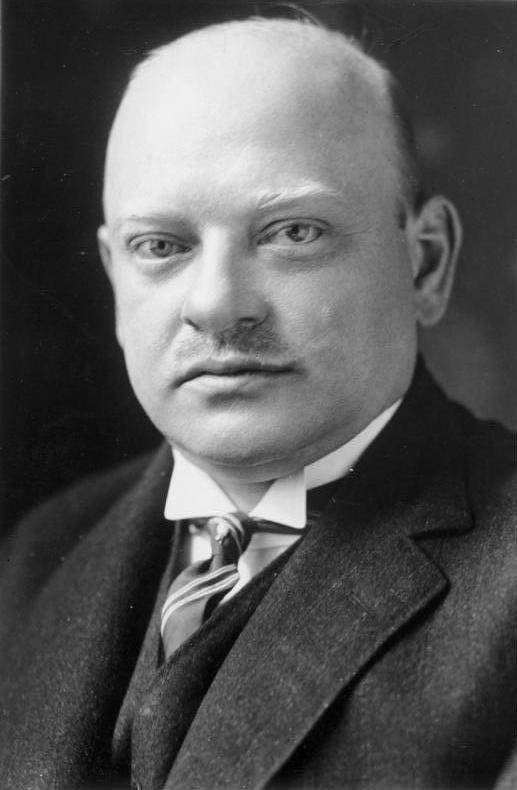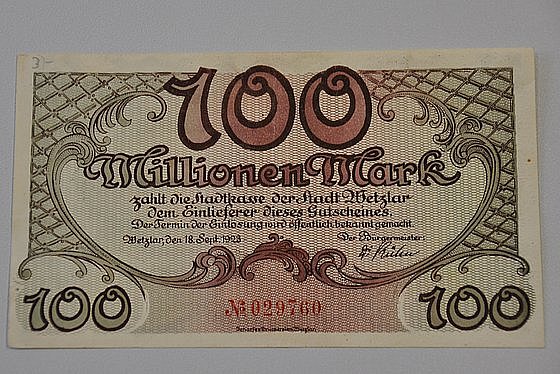
Gustav Stresemann becomes Chancellor of the Reich
Apl. Prof. Dr. Ewald Grothe / History
Photo: UniService Transfer
From Monarchist of the Heart to Republican of Reason
Historian Ewald Grothe on Reich Chancellor Gustav Stresemann
Gustav Stresemann became Chancellor of the Reich on August 13, 1923. How did he get into politics in the first place?
Grothe: Stresemann was interested in politics from a very early age and joined Friedrich Naumann's National Socialist Association (NSV). He was fascinated by Naumann's linking of national with social ideas. Later, however, he did not stay with the left-liberal Naumann Party, but joined the National Liberals in 1903. This also had professional background. After studying national economics, he was employed by various associations, including as in-house counsel for the Association of Saxon Industrialists. In today's terms, he was a lobbyist and established a wide range of connections in politics.

Gustav Stresemann
Photo: Bundesarchiv picture 146-1989-040-27
CC BY-SA 3.0
He resigned after only three months in office. Why?
Grothe: In the Weimar Republic, the imperial governments sometimes lasted for a very short time. This was due to the fact that, unlike in the old Federal Republic, in which there were sometimes only three or four parties in the Bundestag, there really were a large number of parties in the Weimar Republic. Moreover, there was no five-percent clause, and interests were very fragmented: between supporters of the monarchy, republicans and communists, there were worlds apart. There were no people's parties in today's sense; instead, some parties were still very much oriented toward social classes or confessional aspects, such as the Social Democrats for the working class (SPD), the Center Party for the Catholics, etc. In other words, we had a very differentiated party system, and accordingly only coalition governments ever came into being. What we have now in the federal government, that is, three parties in a coalition government, we find unusual. In the Weimar Republic, that was the norm, and there were governments consisting of even more parties. One was always dependent on coalition formations to organize parliamentary majorities. The so-called Weimar coalition of the Social Democrats, the Center and the left-liberal German Democratic Party (DDP), which began in 1919, did not last long either. This made the political situation very volatile, and that is why there were frequent changes of government. Stresemann himself did not even belong to one of the larger parties, but to the national liberal German People's Party (DVP), which never achieved more than 15 percent of the votes for the Reichstag. He was a party co-founder in 1918, party chairman, and the decisive figure in the party until his death. Having earned a high political reputation in the early 1920s, he was brought in early on as Reich Chancellor. After other cabinets before him had failed, Reich President Friedrich Ebert then gave him the chance in August 1923.
Despite the short term of office of just over 100 days, he was able to record some successes? Which ones?
Grothe: The year 1923 was a turbulent year of crisis. He managed to cope with these crises in a very sensible way. Without exaggerating, he really earned merits. Through currency reform, he succeeded in stabilizing the currency again and containing inflation. It was socially intolerable that people had to spend several hundred billion paper marks to buy a loaf of bread. And these inflation bills, which are still circulating among collectors today, are visually very impressive, but they also triggered an inflation shock in the German population, so that people said for a long time: We never want to experience such conditions again! Even in the post-war period after 1945, people have long feared that this could happen again. Stresemann also ensured that passive resistance ("Ruhrkampf") was abandoned and that the Ruhr region, which had been occupied by the French to enforce reparations, was cleared again in 1925. And third, the Republic was threatened politically from both the right and the left. There were government participations by Communists in Thuringia and in Saxony. Here, Stresemann succeeded in pushing back the Communist threat to the Republic with the help of an imperial execution. In Bavaria, on the other hand, then a special case in the Republic, with strong right-wing aspirations even in the state government, things came to a head on November 9 with Hitler's and Ludendorff's putsch and the march on the Feldherrnhalle, as well as the planned march on Berlin. He was also able to save this situation by deploying Bavarian troops and the Reichswehr.
Through his involvement, for example, the German Reich was admitted to the League of Nations. How did he contribute to this?
Grothe: Above all through great negotiating skills! Stresemann had always been interested in foreign policy, and as it turned out, he was a shrewd foreign policy tactician. In 1923, he became Chancellor of the Reich and Foreign Minister, and he continued to reserve the foreign portfolio for himself even after his chancellorship ended, because he realized that it suited him. Thus he remained foreign minister until his death in 1929, and it has even been said that he was the secret Reich Chancellor until 1929. Stresemann was generally recognized both at home and abroad; at home, however, he also had powerful opponents, especially in the right-wing spectrum. On the one hand, he had succeeded in largely reintegrating Germany as a member of the community of nations by negotiating with the Western powers (the 1925 Locarno Treaty) and reaching an understanding with France. He got on particularly well with the French Foreign Minister Aristide Briand, unlike other ministers in France. Reservations in France about Germany were very great after the First World War. On the other hand, Stresemann's policy of understanding continued a line that the left-liberal Walther Rathenau had already begun before him with the German-Russian Treaty of Rapallo in 1922. Stresemann supplemented this treaty with the Berlin Treaty of 1926 with Soviet Russia. Through this mutual understanding with West and East, he succeeded in reintegrating Germany into the community of nations. Germany was given a permanent seat in the League of Nations. Eight years after the end of the war, this was an enormous success for German politics, probably Stresemann's greatest success in foreign policy - albeit with great reservations in Germany itself.
In 1926, he received the Nobel Peace Prize. For what?
Grothe: Confidence-building measures were incredibly important after the end of the war. By reconciling with France, the most bitter enemy in the First World War, Stresemann had gained an outstanding international reputation. This led to the award of the Nobel Peace Prize, which only four Germans have received to date - in the Weimar period, in addition to Stresemann, the left-liberal publicist and politician Ludwig Quidde.

Emergency money in the inflation period
Stresemann's death in 1929 also marked the end of the era of the Weimar Republic. Can you put it that way?
Grothe: That is certainly very abbreviated. It is striking that Stresemann dies in October 1929 and that the stock market crash in New York takes place three weeks later. That is a coincidence in time, but it is coincidental. In contrast to the stock market crash, which was not expected, Stresemann had been in poor health for some time. He had been ill for many years and the enormous strain certainly did not contribute to his recovery. He had to withdraw from politics for weeks in the meantime, so his sudden death did not come as a complete surprise. That this heralded the end of the republic is a bit too far ahead. The stock market crash was a major blow worldwide, and the developments in Germany, especially with the presidential cabinets after 1930, were an enormous threat situation for the Weimar Republic. As a historian, however, one must try to see history through the eyes of contemporaries, i.e. the contemporary of 1929 did not know what would happen in 1933, and it was not so clearly foreseeable. Because even in January 1933 there was freedom enough to decide, even for the Reich President Hindenburg, not to appoint Hitler. The situation would certainly have been difficult, but it was not inevitable to appoint Hitler as Reich Chancellor. Alternatives are always conceivable in history, and this was also true in 1933.
During the Weimar Republic, Stresemann developed into a republican of reason, someone who perhaps still remained attached to the monarchy in his deepest heart, but who saw that one had to come to terms with the new conditions and, even more, promote them. He was enough of a realist and pragmatist to recognize that one had to become a republican and democrat in the new state.
With regard to 1933, it is worth looking back at Stresemann's chancellorship ten years earlier: at the height of the domestic political crisis, the SPD withdrew its confidence from Stresemann's government in November 1923. Reich President Friedrich Ebert (SPD) commented with the thoughtful words, "What prompted you to overthrow the chancellor will be forgotten in six weeks, but you will feel the consequences of your stupidity for ten years to come."
Uwe Blass
Prof. Dr. Ewald Grothe studied history, public law and legal history in Marburg. He habilitated in Wuppertal in 2003 and teaches Modern and Contemporary History at Bergische Universität. He has been an associate professor since 2009. Since 2011, he has headed the Archive of Liberalism of the Friedrich Naumann Foundation for Freedom in Gummersbach.
